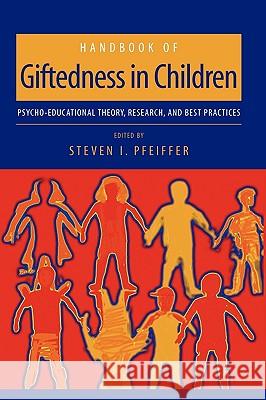Handbook of Giftedness in Children: Psychoeducational Theory, Research, and Best Practices » książka
Handbook of Giftedness in Children: Psychoeducational Theory, Research, and Best Practices
ISBN-13: 9780387743998 / Angielski / Twarda / 2008 / 420 str.
Most leaders in American society recognize that gifted children are among our most precious natural resources. Following the Soviet Union s launch of the Sputnik in the 1960s, our country focused resources on identifying and nurturing America s intellectually gifted. Less than a decade later, however, America s gifted and talented have become an almost neglected special-needs population for a variety of socio-cultural, political, and economic reasons. Even American psychology has given little attention to the unmet and under-met needs of America s most promising youth. The gifted population comprise roughly 5% to 20% of the general population of school-age children depending on which definition of gifted and talented or which set of diagnostic criteria are applied. The gifted are a significant population, based on their numbers and on their potential to make a real difference in our nation s future. A recent survey of international experts in the gifted field published in Professional Psychology: Research & Practice (Pfeiffer, 2001) identified key areas in which professional psychology can play a critically important role in serving the gifted. The article identified specific practice implications for professional psychology, including:
- Assuming a leadership role in the screening and identification of gifted children.
- Serving as consultants in promoting talent development in the schools and in work with families of the gifted.
- Providing counseling services to the gifted, as well as their parents, who are in need of psychotherapeutic intervention.











